- About
-
Advocacy
- Submit Legislative Proposals to the ILA Public Policy Committee
- Advocacy Policies and Procedures
- More Than a Building
- Census 2020 Resources
- Creating or Changing Illinois State Library Law
- Illinois Minimum Wage Resources
- Intro to Property Taxes for IL Libraries
- ILA Public Policy Principles
- Legislative Issues
- Libraries and Immigration Enforcement
- Making Your Case
- Ready, Set, Advocate
- TIFs and Public Library Districts in Illinois
- Top Ten Advocacy Tips
- Unite Against Book Bans in Illinois
-
Committees
- Frequently Asked Questions (FAQ) about ILA Committees
- Advocacy Committee
- Awards Committee
- Conference Program Committee, 2025
- Conference Program Committee, 2026
- Diversity Committee
- Finance Committee
- Fundraising Committee
- ILA Reporter Advisory Committee
- Illinois Libraries Present Committee
- Illinois Public Library Standards Committee
- Intellectual Freedom Committee
- iREAD Committee
- Nominating Committee
- Public Policy Committee
- Reaching Forward North Committee
- Reaching Forward South Committee
- Events
-
Forums
- Frequently Asked Questions (FAQ) about ILA Forums
- Human Resources & Administration Forum (HRAF)
- Illinois Association of College & Research Libraries Forum (IACRL)
- Library Trustee Forum (LTF)
- Marketing Forum (MF)
- Resources & Technical Services Forum (RTSF)
- Retired Members Forum
- Small and Rural Libraries Forum (SARL)
- Students and New Professionals Forum (SANP)
- Young Adult Services Forum (YASF)
- Youth Services Forum (YSF)
- Initiatives
- Membership
- Publications
This bibliography represents books challenged, restricted, removed, or banned in 2011 and 2012 as reported in the Newsletter on Intellectual Freedom from May 2011-May 2012. (Dates prior to May 2011 indicate the controversy began earlier, but continues into 2012.)
Alexie, Sherman
The Absolutely True Diary of a Part-Time Indian
Thorndike Press; Little, Brown
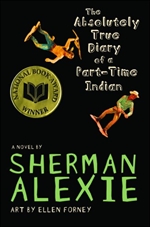
Banned, but later returned to the Richland, Wash. school district’s reading list (2011) despite objections to the “coarse themes and language in the young-adult novel.” Pulled from the Dade County, Ga. library shelves and the required high school reading list (2011) because of complaints about “vulgarity, racism, and anti-Christian content.” Challenged at the Old Rochester Regional Junior High School in Mattapoisett, Mass. as an eighth-grade English assignment (2011). Challenged as required reading in at least three freshmen English classes at Westfield, N.J. High School (2012) because of “some very sensitive material in the book including excerpts on masturbation amongst other explicit sexual references, encouraging pornography, racism, religious irreverence, and strong language (including the f- and n-words).”
Source: Newsletter on Intellectual Freedom, Sept. 2011, pp. 196-97; Jan. 2012, pp. 9, 13; May 2012, pp. 105-6.
Anderson, Laurie Halse
Speak
Farrar, Straus and Giroux
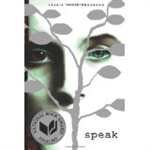
Challenged, but retained in the Republic, Mo. schools (2010) despite complaints that it is “soft-pornography,” “glorifies drinking, cursing, and premarital sex,” and “teaches principles contrary to the Bible.”
Source: Newsletter on Intellectual Freedom, Nov. 2010, pp. 243-44; Sept. 2011, pp. 175-76.
Berger, John
To The Wedding
Vintage

Challenged as assigned reading for juniors in the International Baccalaureate program at Murrieta Valley, Calif. High School (2011) because some parents said students shouldn’t be exposed to the mature content, which includes, on at least three occasions, the use of the f-word to describe sexual relations that take place.
Source: Newsletter on Intellectual Freedom, Mar. 2012, p. 59.
Bhagavad-Gita As It Is

With the original Sanskrit text, roman transliteration, English equivalents, translation, and elaborate purports by A. C. Bhaktivedanta Swami Prabhupada. Bhaktivedanta Book Trust. A Russian court has dismissed a call to ban an edition of the Hindu holy book, in a case that triggered protests in India. The commentary, not the text itself, was the cause for scrutiny, according to prosecutors in the Siberian city of Tomsk who wanted the edition to be ruled “extremist.” The Russian translation of the book was at risk of being placed on the Federal List of Extremist Materials, which bans more than 1,000 texts, including Mein Kampf and publications by the Jehovah’s Witness and Scientology movements.
Source: Newsletter on Intellectual Freedom, Mar. 2012, p. 82.
Brown, Laurie Krasny and Marc Brown
What’s the Big Secret? Talking about Sex with Girls and Boys
Little, Brown, and Company

Challenged, but retained at the Oak Harbor, Wash. School District No. 201 (2011) despite a parent’s concern that the book discusses sex and “it’s completely too graphic.”
Source: Newsletter on Intellectual Freedom, July 2011, p. 137.
Butler, Dori Hillestad
My Mom’s Having a Baby
Albert Whitman & Company

Challenged in the Carrollton, Tex. Library (2011) because it is inappropriate for children. The book won an Editor’s Choice award from Booklist in 2005 and was named a Top Ten Sci-Tech Book for Youth by Booklist. Retained at the Hillsborough County, Fla. Public Library System (2011). Published in 2005, the book tells of a little girl named Elizabeth who is curious about childbirth and how her mother became pregnant. Throughout the book’s thirty pages, little Elizabeth learns about these topics in great detail.
Source: Newsletter on Intellectual Freedom, May 2011, pp. 95, 116.
Capote, Truman
In Cold Blood: A True Account of a Multiple Murder and its Consequences
Modern Library; Random; Vintage; G.K. Hall; Transaction

Some Glendale, Calif. Unified School District officials and parents (2011) attempted to block a request by a high school English teacher to add the text to the district’s advanced English curriculum because the nonfiction book was “too violent for a young audience”; the school board voted 4-0 to approve the book for Advanced Placement students. Since its publication in 1965, it has been widely recognized as a seminal work in American literature, frequently appearing on high school and college reading lists.
Source: Newsletter on Intellectual Freedom, Nov. 2011, p. 204; Jan. 2012, pp. 35-36.
Card, Orson Scott
Ender’s Game
Tor Science Fiction

A teacher at Schofield Middle School in Aiken, S.C. (2012) will not face criminal charges for reading to his students from the science-fiction book. In addition to the Card novel, which has won several science-fiction awards and is listed on numerous children’s literary review websites as appropriate for children twelve and older, the teacher read excerpts from an Agatha Christie novel and a young adult novel set in the Old West, officials said. The incident came to light after the materials were characterized by one student and one parent as pornographic, according to a press release issued by the school district.
Source: Newsletter on Intellectual Freedom, May 2012, p. 107.
Cast, P.C., and Kristin Cast
Betrayed
St. Martin’s Griffin

Challenged in the North Star Borough School District, Fairbanks, Alaska high school libraries (2011) because, “It simply causes kids to think even more of things sexual.” The teenage vampire novel is part two of the “House of Night” series.
Source: Newsletter on Intellectual Freedom, May 2011, p. 93.
Chbosky, Stephen
The Perks of Being a Wallflower
Pocket Books

Challenged, but retained, at the Clarkstown, N.Y. North High School (2011) despite a parent’s complaint about the coming-of-age novel, which deals graphically with teenage sex, homosexuality, and bestiality.
Source: Newsletter on Intellectual Freedom, May 2011, pp. 97-98; July 2011, p. 161.
Doyle, Sir Arthur Conan
A Study in Scarlet
Oxford University Press

Removed from the Albermarle County, Va. School sixth-grade required reading list (2011) because the book casts Mormonism in a negative light. The complaint cited the novel’s reference to Mormons as “murderous” and “intolerant,” as reason to remove the work. The complaint also alleged that the work unfairly characterized Mormons as murderous kidnappers. The classic novel was the first to present the character of the brilliant sleuth Sherlock Holmes and his friend, Dr. Watson. Doyle wrote the novel in three weeks; it was published in 1886.
Source: Newsletter on Intellectual Freedom, Sept. 2011, pp. 177, 200-01; Nov. 2011, p. 205-6.
Ehrenreich, Barbara
Nickel and Dimed: On (Not) Getting by in America
Holt

Challenged, but retained on the Easton, Pa. Area High School’s Advanced Placement English reading list (2012) despite several residents and persons from outside the district calling the book “faddish,” of “no moral value,” and even “obscene.”
Source: Newsletter on Intellectual Freedom, May 2012, pp. 128-29.
Findley, Timothy
The Wars
Clark, Irwin

Challenged, but retained in the Bluewater, Ont., Canada, classrooms (2011) despite requests to ban the book because it “includes a number of very explicit and detailed descriptions of sexual encounters, most of them exploitive and violent.” Several parents “objected especially to details about the hero’s visit to a ‘whorehouse’ and to a vivid description of the young Canadian soldier’s gang rape by fellow soldiers.” The book is not compulsory and is on the list of books that can be used in the Grade Twelve curriculum, the final year of secondary school in Canada with students being seventeen or eighteen years old.
Source: Newsletter on Intellectual Freedom, July 2011, p. 139; Jan. 2012, p. 36.
Green, John
Looking for Alaska
Speak

Challenged as required reading for Knox County, Tenn. High Schools’ Honors and as Advanced Placement outside readings for English II (2012) because of “inappropriate language.” School Superintendent Dr. James P. McIntyre, Jr. said that a parent identified this as an issue and the book was removed from the required reading list. He didn’t say whether the book was still in the schools.
Source: Newsletter on Intellectual Freedom, May 2012, pp. 107-8.
Gruen, Sara
Water for Elephants
Algonquin Books

Removed from a spring break elective course at the Bedford, N.H. School District (2010) after a parent complained about the novel’s sexual content. The complainant further suggested that the school only allow “youth versions” of particular books or organize a parental review system over the summer that would look at books that students need parental permission to read. A checklist has been proposed that Bedford school officials would use to rate books and other instructional materials.
Source: Newsletter on Intellectual Freedom, May 2011, pp. 96-97.
Harris, Robie H.
It's Perfectly Normal: A Book about Changing Bodies, Growing Up, Sex, and Sexual Health
Candlewick Press
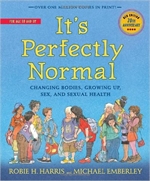
Challenged, but retained at the Lee County, Fla. libraries (2011) despite the book’s explicit illustrations.
Source: Newsletter on Intellectual Freedom, Nov. 2011, p. 218.
Hergé
Tintin in the Congo

A Belgian court (2012) rejected a five-year-old bid by a Congolese student to have the 1946 edition of Herge’s book banned because of its racist depictions. “It is clear that neither the story, nor the fact that it has been put on sale, has a goal to … create an intimidating, hostile, degrading or humiliating environment,” the court said in its judgment. Bienvenu Mbutu Mondondo, who launched the campaign in 2007 to ban the book, plans to appeal.
Source: Newsletter on Intellectual Freedom, Jan. 2012, pp. 17-18; May 2012, p. 130.
Hosseini, Khaled
The Kite Runner
Bloomsbury
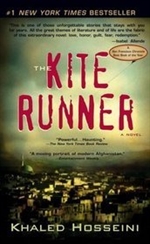
Challenged, but retained as part of Senior Advanced Placement English at the Valley View High School in Jonesboro, Ark. (2011). The issue arose after two patrons disapproved of the novel because of a scene depicting male-on-male rape, sexual innuendo, and vulgar language, as well as religious content throughout the book. Challenged as optional reading in the tenth-grade honors class at Troy, Pa. Area Schools (2012) because the novel depicts a sodomy rape in graphic detail and uses vulgar language.
Source: Newsletter on Intellectual Freedom, Mar. 2012, p. 79; May 2012, pp. 106-7.
Kehret, Peg
Stolen Children
Dutton

Challenged, but retained at the Central York, Pa. School District (2011) despite a parental concern that the book “was too violent.” The book centers on the kidnapping of thirteen-year-old Amy and her three-year-old babysitting charge. The kidnappers videotape the pair and send the DVDs to their parents for ransom; Amy works to send clues through the videos to help police find them.
Source: Newsletter on Intellectual Freedom, Mar. 2011, p. 52; May 2011, p. 114.
LaCour, Nina
Hold Still
Dutton Books

Pulled from the Blue Springs, Mo. School District library and classrooms (2011) because the book is “riddled with obscenities.” The novel is about a young girl coping with the suicide of her best friend. The book, according to parents, was read as part of an extra credit assignment in a freshman English class. The local chapter of the ACLU is threatening to get involved if the book is permanently removed.
Source: Newsletter on Intellectual Freedom, Jan. 2012, pp. 9-10.
Lelyveld, Joseph
Great Soul: Mahatma Gandhi and His Struggle with India
Knopf

Banned in parts of India (2011). A Santa Cruz, Calif. educational organization, Foundation for Excellence, canceled an event planned in honor of the Pulitzer Prize-winning author (2011). The foundation provides scholarships for students in India and canceled the event after the biography hinted a homosexual relationship between Gandhi and a German named Hermann Kallenbach. The foundation “didn’t want to be involved with any controversy.”
Source: Newsletter on Intellectual Freedom, July 2011, pp. 141-42.
Lott, Bret
The Hunt Club
Harper Perennial

Challenged as one option for the required summer reading at Wando High School in Mount Pleasant, S. C. (2011) because it “uses foul language, degrades women, and people of color.” The novel is set in the South Carolina Lowcountry and tells the story of a teenage boy and his uncle who find a dead body and have to figure out what happened.
Source: Newsletter on Intellectual Freedom, Nov. 2011, pp. 204-5.
Mackler, Carolyn
Tangled
Candlewick Press

Banned from the Borger, Tex. Independent School District intermediate and middle school library and removed from class reading lists (2011) because of concerns over sexual content and profanity.
Source: Newsletter on Intellectual Freedom, Nov. 2011, pp. 203-4.
Martinez, Elizabeth
500 Years of Chicano History in Pictures
Southwest Community Resources

Banned from the Tucson, Ariz. Unified School District (2012) along with Critical Race Theory, by Richard Delgado; Message to Aztlan, by Rodolfo Corky Gonzales; Chicano! The History of the Mexican Civil Rights Movement, by Arturo Rosales; Pedagogy of the Oppressed, by Paulo Freire; Rethinking Columbus: The Next 500 Years, edited by Bill Bigelow and Bob Peterson; and Occupied America: A History of Chicanos, by Rodolfo Acuña. In a district with over sixty percent of the students coming from Mexican-American backgrounds, the school board “dismantled its Mexican-American Studies program, packed away its offending books, shuttled its students into other classes,” according to an editorial in the New York Times, because “it was blackmailed into doing so.” The Times referred to measures taken by Arizona Superintendent of Public Instruction John Huppenthal, who threatened to withhold millions of dollars if the school district didn’t terminate the nationally acclaimed program immediately. The superintendent has spent years crusading against ethnic-studies programs that he claims are “brainwashing” children into thinking that Latinos have been victims of white oppression.
Source: Newsletter on Intellectual Freedom, Mar. 2012, pp. 49, 51, 82-84; May 2012, pp. 102-3.
Morrison, Toni
Beloved
Knopf; NAL

Challenged, but retained as a text in Salem, Mich. High School Advanced Placement English courses (2012). The complainants cited the allegedly obscene nature of some passages in the book and asked that it be removed from the curriculum. District officials determined the novel was appropriate for the age and maturity level of Advanced Placement students. In reviewing the novel, the committee also considered the accuracy of the material, the objectivity of the material, and the necessity of using the material in light of the curriculum.
Source: Newsletter on Intellectual Freedom, Mar. 2012, pp. 79-80; May 2012, p. 127-28.
Morrison, Toni
The Bluest Eye
Knopf; NAL

Challenged in the Brookfield, Conn. High School curriculum (2011) because of sex scenes, profanity, and age-appropriateness of the book. Students in the high school have been reading Morrison’s book since 1995.
Source: Newsletter on Intellectual Freedom, Jan. 2012, pp. 11-12.
Murakami, Haruki
Norwegian Wood
Farrar, Straus and Giroux

Pulled from the required summer reading list for middle school and high school students at the Monroe Township Schools in Williamstown, N.J. (2011) after parents complained about a gay sex scene.
Source: Newsletter on Intellectual Freedom, Nov. 2011, p. 204.
Nasrin, Taslima
Lajja (Shame)
Motilal UK Books of India

The head teacher at the K.C. Technical and Business Management College in Dhaka, Bangladesh (2012) was arrested after the book, considered blasphemous by some Muslims, was found in the school’s library. The teacher could face up to three years in jail if he is found guilty of authorizing the book’s inclusion in the library. The Prothom Alo newspaper said the teacher denied having the book and said he was the victim of a conspiracy. The novel was banned a year after its publication in 1993, and Nasrin was forced to flee Bangladesh to escape death threats from radical Muslims who considered it blasphemous for advocating secularism.
Source: Newsletter on Intellectual Freedom, Mar. 2012, p. 63.
Naylor, Phyllis Reynolds
Lovingly Alice
Atheneum

Removed from the Quail Run Elementary library in the Paradise Valley, Ariz. Unified School District (2011) after the mother of an eight-year-old student complained about its sexual content.
Source: Newsletter on Intellectual Freedom, July 2011, pp. 136-37.
Ockler, Sarah
Twenty Boy Summer
Little, Brown

Removed from Republic, Mo. High School (2011), but later returned and stored in a secure section of the library only accessible to parents. Teachers cannot require the book nor read it aloud in school. A Republic resident filed a complaint about the appropriateness of the book because it sensationalizes “sexual promiscuity, questionable language, drunkenness, lying to parents, and a lack of remorse by the characters.”
Source: Newsletter on Intellectual Freedom, Nov. 2010, pp. 243-44; Sept. 2011, p. 175; Nov. 2011, p. 203.
Pilkey, Dav
The Adventure of Super Diaper Baby
Scholastic

Banned from the Channelview, Tex. Independent School District (2011) because it contained the phrase “poo poo head.”
Source: Newsletter on Intellectual Freedom, Sept. 2011, p. 176.
Richardson, Justin, and Peter Parnell
And Tango Makes Three
Simon
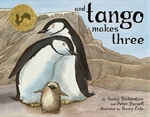
Pulled from the Gibbs Elementary School in Rochester, Minn. (2011) as inappropriate for elementary school students and removed from school library shelves. This decision was later reversed as a mistake for failing to follow district policy. Eventually, a “temporary resolution” was reached requiring that one of the parents who challenged the book be present when their child checks out books from the school media center in the future.
Source: Newsletter on Intellectual Freedom, May 2012, p. 127.
Sapphire (Ramona Lofton)
Push
Vintage

Challenged on an extracurricular reading list in the Horry County, S.C. school library (2011). The 1996 novel is based on the story of Precious Jones, an illiterate sixteen-year-old, who grows up in poverty. Precious is raped by her father, battered by her mother, and dismissed by social workers. The story follows Precious, pregnant with a second child by her father, through her journey of learning how to read and be on her own. The novel was made into a critically acclaimed movie, Precious, in 2009, which received six Oscar nominations, including Best Picture.
Source: Newsletter on Intellectual Freedom, May 2011, p. 94.
Schrag, Ariel
Stuck in the Middle: 17 Comics from an Unpleasant Age
Viking

Challenged, but retained in three Maine towns -- Dixfield, Mexico, and Buckfield -- middle school libraries (2011) despite “objectionable sexual and language references.” The book, however, will be placed in the libraries’ professional collection, which means a student may take out the book only if parental permission is granted.
Source:Newsletter on Intellectual Freedom, Mar. 2012, pp. 57-58.
Semencic, Carl
Pit Bulls and Tenacious Guard Dogs
Thomasson Grant & Howell

Banned at the Logan, Australia West Library (2011) because it contains information on restricted dog breeds. In 2001, under Local Law 4 (Animal Management) the Logan City Council placed a ban on, among others, pit bull terriers and American pit bulls. Therefore, Logan City Council libraries do not stock literature on any of the prohibited breeds.
Source: Newsletter on Intellectual Freedom, May 2011, p. 118.
Shakespeare, William
No Fear Shakespeare Romeo and Juliet
SparkNotes

Some parents in Liberty, S. C. (2012) are furious about the book their kids are reading in middle school. They say it’s too mature for their kids because of the sex. The book in question is an easy-to-read version of Shakespeare’s Romeo and Juliet.
Source: Newsletter on Intellectual Freedom, May 2012, p. 107.
Sheff, Nic
Tweak: Growing Up on Methamphetamines
Atheneum

Pulled from the required summer reading list for middle school and high school students at the Monroe Township Schools in Williamstown, N.J. (2011) because the book includes “depictions of drug usage and a homosexual orgy.”
Source: Newsletter on Intellectual Freedom, Nov. 2011, p. 204.
Swift, Graham
Waterland
Vintage

Challenged as a text in Salem, Mich. High School Advanced Placement English courses (2012) due to the book’s sexual content. Superintendent Jeremy Hughes immediately pulled the book, but later decided to put the book through the district’s review process. The book was reviewed and retained.
Source: Newsletter on Intellectual Freedom, Mar. 2012, pp. 59-60; May 2012, pp. 127-28.
Vonnegut, Kurt
Slaughterhouse-Five
Dell; Dial

Removed from Republic, Mo. High School (2011), but later returned and stored in a secure section of the library accessible only to parents. Teachers cannot require the book nor read it aloud in school.A Republic resident filed a complaint about the appropriateness of the book arguing that it teaches principles contrary to the Bible.
Source: Newsletter on Intellectual Freedom, Nov. 2010, pp. 243-44; Sept. 2011, p. 175; Nov. 2011, p. 203.
Von Ziegesar, Cecily
Only in Your Dreams: A Gossip Girl Novel
Little

Challenged at the Lake County, Fla. Public Library (2011) by a county commissioner because the book explicitly details the lives and loves of privileged adolescent girls in New York City. The book inspired a popular television series, which premiered in 2007. Removed from all libraries in the Picayune, Miss. school district (2011) due to the book’s explicit language.
Source: Newsletter on Intellectual Freedom, Nov. 2011, pp. 202-3.
Walls, Jeannette
The Glass Castle: A Memoir
Scribner
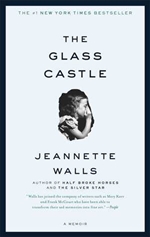
Challenged, but retained as part of the tenth-grade English curriculum in the Sade-Central City High School classrooms in Cairnbrook, Pa. (2012). The 2005 best-selling memoir in which Walls describes her hardscrabble upbringing includes sexual assault, casual profanity, drunkenness, seeing the family cat pitched from a moving car, and having to drink ditch water. Even critics of the graphic book praise its theme – overcoming adversity.
Source: Newsletter on Intellectual Freedom, May 2012, p. 128.
Watson, Larry
Montana 1948: A Novel
Milkweed Editions

Challenged, but eventually retained at the Merrill, Wis. High School (2011) despite some parents complaining that it is “questionable reading material for their tenth-grade students because of language, and sexual and racist themes.” School leaders added it to the curriculum twelve years ago, saying it was a less controversial substitute for Catcher in the Rye. School leaders also said students have the option of reading a different book if they don’t feel comfortable with the one they’re assigned.
Source: Newsletter on Intellectual Freedom, July 2011, pp. 161-62; Nov. 2011, p. 206; Jan. 2012, p. 35.

 iREAD Summer Reading Programs
iREAD Summer Reading Programs Latest Library JobLine Listings
Latest Library JobLine Listings